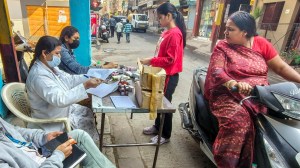Heavy metal
After battling the Konkan Railway and Thapar duPont's Nylon 6,6 plant inless than a decade, Goa's green lobby with support from the Cathol...

After battling the Konkan Railway and Thapar duPont8217;s Nylon 6,6 plant inless than a decade, Goa8217;s green lobby with support from the Catholic churchhave trained their sights on a Rs 200 crore metal recycling plant.
Meta-Strips, a company promoted by the Jindals and their associates toextract copper and copper alloy strips from imported scrap.
It is feared that the plant, located on farmland at Sancoale, would affectlocal agriculture and deprive the people living in the local community ofscarce water and power.
The campaign against the plant intensified last month with residents ofsouth Goa in the vicinity of the plant rioting and fighting police on thestreets. With some protestors carrying out an indefinite hunger strikeoutside the Secretariat in Panaji, Chief Minister Fransisco Sardinha optedto buy peace by temporarily shutting down the Meta-Strips plant. An enquiryhas been ordered with experts from the government and the Anti Meta-StripsCitizens Action Committee AMCAC looking into the pollution aspects of theplant.
The state government relied on clearances from the Union government and theenvironment impact assessment reports submitted by the company to clear theproject. The state government8217;s pollution control board does not have theneeded expertise or equipment to monitor pollution caused by companiescoming up in Goa. Sardinha has promised to rectified. He told the media whenthe agitation was at his height, quot;We will buy the equipment and upgrade thestate pollution control board in two months.quot;
Campaigners against the project have relied on Goa8217;s landmark Right toInformation Act to ferret out details on how the project was givenpermission to operate. The company was originally conceived as Nashik WiresLtd in 1996. Subsequently it was renamed the following year and its projectplans altered. The plant8217;s annual output of copper and copper alloys wasreduced to 30,000 tonnes from 47,280 tonnes.
It also announced plans to manufacture copper strips and briquettes insteadof the originally proposed wires. But environmentalists argue, 8220;The processinvolved in making these strips and briquettes would, however, causetremendous pollution,8221; allege environmentalists.
According to Claude Alvares, director, Goa Foundation, who presented areport on pollution likely to be caused by the plant, international trade indiscarded PVC-coated telephone wires is due to be banned under the BaselConvention. The PVC coated wires will be the main raw material for theplant. 8220;Even though PVC will first be stripped from the wires some residuewill remain on the copper cable which will release dangerous toxins whenburnt,quot; says Alvares. The toxins are known to cause severe health problemsand are known to even affect human sexuality severely, according toAlvares.
The company however justified the change in its raw material on the groundsthat it was necessitated by technological requirements. 8220;When we firstconsider a particular type of machinery we don8217;t get all the details aboutthe raw materials required8230;the final picture is available only wheneverything is finalised,quot; Sushil Khaitan, chairman of Meta-Strips, had toldthis correspondent.
In the presentations made to the local press and citizens8217; groups, thecompany insisted that its processes are pollution free. 8220;We are using purecopper in our furnaces. The smelting process which is actually polluting isnot required by us,8221; Khaitan insists. The Environment Impact Assessmentreported conducted by Societe General de Surveillance SGS also gives aclean chit for the project.
Apart from the pollution hazard, the Meta-Strips plant will also be a bigconsumer of water in an area where water is already scarce. The revisedproject was to consume 4 MLD million litres daily of water from theearlier estimate of 0.6 million MLD. Following protests from the people, thecompany revised its water requirements to 2 MLD of water. However, last Junethe state government8217;s Public Works Department submitted an affidavit beforethe Panaji bench of the Mumbai High Court, stating that the government wouldnot be able to meet the plant8217;s water requirements.
Khaitan, however, remains unfazed by the problem. 8220;We will hire tankers tobring in water,8221; he told The Indian Express. This however translates toanything between 150 to 200 tankers per day depending on the vehicles8217;carrying capacity. With the economics of the tanker business not permittingthe transport of water for more than 10 to 15 km, it is feared that thesuppliers will tap wells in the villages nearby. According to the Khaitan,the company is negotiating with the government to lay a special pipeline toits plant from the Selaulim reservoir nearby.
Incidentally, the Meta-Strips plant was shifted from the Verna industrialestate to its present location following opposition from the pharmaceuticalcompanies there. After trying to push through the project for the whole of1996, the state government acquired 2,41,965 square metres of land atSancoale and leased it to Meta-Strips at just Rs 74,000 per year.
There is also an interesting social dimension to this episode. Theagitation against the project has resulted in a war of words between theCatholic Church and the company. The Church insists that it has right tochampion social causes. Archbishop Raul Gonsalves came out on the streetsduring a protest march and agitators used Church premises to battle police.The company hit back in letters to the local press by accusing the clergy oftrying to deindustrialise Goa. Last year on the eve of Pope John Paul8217;svisit to India, the company attempted unsuccessfully to whip up hysteriaagainst the event by inserting advertisements in the national press.
- 01
- 02
- 03
- 04
- 05































